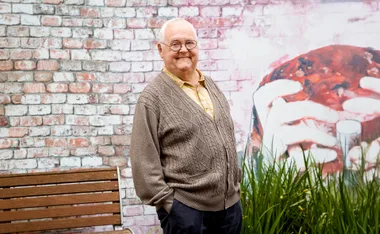Alexandra Potter’s latest book, Do you Come Here Often? (Black Swan) has been selected as the Great Read in the May issue of The Australian Women’s Weekly.
**Q What kind of book did you set out to write?
A** I was interested in the idea of people in relationships for a long period of time who for one reason or another, wake up one morning, look at their partner think, ‘I’m not in love with this person any more. I thought they were Mr Right and actually, they’re Mr Wrong.” And what happens? Do you stay with this person? Do you leave and hope you’re going to find somebody else? I’m 33 and a lot of my friends say it’s very difficult being single again in your thirties and forties. I thought that’s a really interesting idea of what it’d be like to be in the place they call The Desert. They keep saying, it’s a dating desert out there.
But I didn’t just want to write a book aimed at my age range because Mum reads my books and so do her friends. So there are two characters in there in their fifties, Maggie and her partner Sonny. There are six main characters and they are all very different. Some of it is very funny. Other aspects, such as what happens to Maggie, is very serious. I wanted to explore everyone’s different views on love, falling in love, living happily ever after. Because at the end of the day I think that’s what everybody hopes for. To meet the person that they’re going to spend the rest of their life with.
**Q Do you believe women are still looking for that despite the high divorce rate and all the other options there are for women these days?
A** Yes. The main character Grace, does leave her fiancé and is single again. And it’s about how terrible it all is and yet how brilliant it is. Because she does actually meet the man of her dreams, who is actually an old boyfriend. At the very end she has realised that it is better to be alone than to be with the wrong man. So even though very much we all want to meet Mr Right, if you don’t meet him it is better to be single than in a relationship that doesn’t feel right.
**Q A talkback radio show for the lovelorn is a link throughout your book – is that because such a lot of people nowadays are more likely to use something like that or a dating agency or an online matchmaker to meet someone?
A** Yes. I think it’s very interesting that we work at our careers, we have to work at our appearances and do serious research and thinking before buying a house. Anything like that we have to employ a strategy and work at it. But with love we think it’s just going to happen. That we’re going to waltz down the street and cupid’s going to fire his arrow and we will suddenly fall in love. But if we approach it like finding a job or buying a house, then we will do something like join a dating agency or ring up talkback show for singles. And it shouldn’t be looked upon as being sad or unromantic, it’s just a way of meeting someone. Because it’s very hard to meet people, especially the older you get. It’s not like it was in your twenties and everyone’s hanging out in gangs.
When I was writing this book I became single again.
**Q But didn’t you have a boyfriend for like seven years?
A** When I started writing this book, fiction started becoming fact. I became the main character in the book. I was suddenly single again, and I discovered was in Couplesville. The weekends became hard. Everyone was with a partner and I was like, ‘oh! What do I do now?’ It’s hard to meet people. The idea for the radio show came about because I was driving home and just tuned in to a radio show by accident and starting hearing this talk-back program where people were looking for Mr Right, or Mrs Right. I drove up outside my apartment and I kept my engine running and sat there listening to it. I thought that was such a good idea to use as a backdrop for the book because everyone likes it. Listening to people’s letters being read out is like reading from a diary, because people are quite personal when they’re writing a letter. And when they ring in, you can’t see what they look like, you can just hear they’re voice. And that’s a good thing because a lot of the time we base a lot on what people look like. I don’t think it should be like that so much.
**Q Like Grace, did you suddenly find Mr Right had become Mr Wrong?
A** (Snort of laughter). It’s quite funny because it was a slow process, although you don’t admit it to yourself. So things start going on in your relationship but you don’t pick up on it, yet you’re quite, generally unhappy. It was just like…I don’t know, it was like an epiphany. You just one day, something happens and you ‘think this isn’t right.’ And al those little clues that happened over the past years ultimately come into focus and you think ‘I’m not with the right person.’ But then what do you do? I was very much with someone I did love. We were supposed to be getting married and he was my best friend, so it’s not like we were fighting or he had an affair. We were very comfortable and it’s a very difficult decision to make to walk away or stay in a relationship. I’m very much the hopeless romantic, maybe I’m living in a dream world but I want this great, can’t live without you love. And I thought this isn’t what I’ve got here. So I decided to leave. But it was still very, very painful. Breaking up is a difficult thing to do and I write about it in my book. Everyone thinks you watch Four Weddings and a Funeral and cry a bit and drink some chardonnay and play I Will Survive and you get over it. But it’s very hard. You’ve got to find your own flat to live in, all sorts of things. It’s much, much harder than you think.
**Q And how are you now?
A** I actually fell in love.
**Q No!
A** I did I did, I really do think my book is coming true. I finished the book and went to see my sister who lives in Los Angeles. I was there for a few months and I met a man and I fell in love. It was like ‘wow!’ I didn’t think it would happen again but it did. I’m really, really happy at the moment. Fingers crossed.
**Q Is he American?
A** He’s Israeli but grew up in New York. Has a great sense of humour, like Australians, which a lot of people from LA don’t have. I lived in Australia for a year, 1998-1999. I worked at a couple of magazines and started writing features there. I absolutely loved Australia. I made some brilliant friends, but unfortunately one night I was out, crossing Oxford Street (Sydney) and I got knocked down by a car. And would you believe, people laugh when I tell this story (even though I broke my shoulder and I had to fly back to England for an operation), but it was being driven by a couple of nuns! They weren’t wearing habits but it was two nuns who knocked me down. It was just one of those mad things. So I had to leave Sydney because I wanted to have the operation in the UK so I could be near my parents. So I stayed in England and never came back except for a quick visit for the first time just before Christmas to catch up with friends and see my publisher, Random House. I was there for the Rugby World Cup, which was great.
**Q Did the accident happen at night-time?
A** Yes. I was in Oxford St Paddington, had been out for dinner and was trying to hail a cab and I was crossing the road. I don’t know what happened. I woke up and I was in an ambulance and apparently I’d been hit by these two nuns. They must have got the shock of their life because I went through the windscreen. They were quite elderly nuns so they probably couldn’t see very well and I was wearing black at the time. Trying to be a fashionista.
**Q You’re very lucky to be alive?
A** Very much so, I think I’m like a cat. I’m down to about seven lives now.
**Q How is your new relationship going to work with you in London and your boyfriend in LA?
A** I just got a writer’s visa for America so I am going back there in few weeks, to be with him. I am writing my next book Be Careful What You Wish For. Maybe(laughing), that’s significant. I keep thinking how you wish for all these things and when they come true, you think hmmm! ‘I didn’t really want that.’ But I’m going back to America and writing the next book and will hopefully live happily ever after.
**Q Are you moving in together?
A** No I’m going to stay with my sister. I’m dreadful because I fall in very quickly, head over hells, but I thought I’d try to be very sensible and go and live with my sister for a while and take it very slowly. And see what happens. Being a writer is a huge bonus because you can write anywhere.
**Q I read you wanted to be a writer since you were 6 and wondered if anything happened back then that triggered the desire?
A** I’m from a little place in England called Bradford which is where the Bronte sisters grew up and when I was little I vividly remember being taken to the Bronte Parsonage in a tiny village in the Yorkshire Dales. And my Mum told me the story for Wuthering Heights and Jane Eyre. In the museum they had the little books that as children they would write stories in. Miniature books and that struck a chord with me and I remember going home and trying to write one of these little books myself. From then on I was always writing short stories and trying to write books. So I’ve always wanted to write a book but it was very much a dream. I didn’t think someone like me could. I thought you had to be somebody special. And it was only when I got older and I was working as a Sub-Editor on a magazine and working on a feature about 6 twenty-something women who had written their first novel that I realised if they could do it, so could I. So I had a bash at a book and it was my first one, What’s New Pussycat. I never had to go back to a day job again. I sold the film rights to Working Titles who made Four Weddings and a Funeral and Notting Hill, and they wanted Posh Spice, Victoria Beckham to play the lead. The main character was a woman called Delilah who was a huge Tom Jones fan. They thought it would be great for Posh but she went off and had a baby and nothing happened. And I sold the film rights to the third book, Calling Romeo, so at the moment they’re writing the screenplay of that. We’ll have to see what happens.
**Q This is your fourth book?
A** Yes, it’s really weird, I can’t believe it. I’m writing book five. It seems unbelievable, it was always my big dream to write novels. When a dream comes true sometimes you have to pinch yourself to make sure it’s happened.
**Q I imagine it’s also harder then you thought it would be?
A** Yes the first book is very easy. You’ve got so much to write because you’ve never written a book before. And of course you’re always trying to make the next one better. Trying to be original. Different. And of course you’re using up your ideas so you need to be having lots of experiences. It’s very much a job. You sit there every day, 9-5. Or whatever hours you work. People think you wander around being hit with inspiration, but it’s not the glamorous job they think. I sit in my little back bedroom, at a desk, writing. It’s a job like anything else.
**Q How many brothers and sisters do you have?
A** Only my older sister. She moved out to LA when she was 18. She’s about 36 now.
**Q Parents’ professions?
A** Mother was a school secretary and my father had engineering firm. They’re retired now. As a child, my Grannie looked after me because mum went out to work. In Calling Romeo one of the main characters is an 80 year old called Violet who was very much my grandmother. She was the lady I knew until I was about 5 years old.
**Q Who reads your finished manuscripts first?
A** My editor. I’m very private and secretive. A lot of authors I know write chapter by chapter and give it to their partner or friends. I write the whole book. Nobody sees it. I am my own worst critic, constantly thinking ‘oh this is rubbish and I don’t want anyone to read it.’
**Q Are you good at concentrating when you’re writing?
A** I get terribly distracted. I’ll do anything. The washing up. Clean up my wardrobe. I have to be really firm with myself and lock myself away.
**Q Date of birth?
A** May 8, 1970, a typical Taurean.
**Q What’s that?
A** They love food. Very romantic. Quite stubborn. Very loyal. We take a long time to do things and make decisions but we’re quite tenacious. If we start something we always finish it.
**Q Finish the sentence Alexandra Potter loves…?
A** I love, ooh gosh – I love shopping. I’m dreadful. I’m a big walker. I do a lot of light exercise. I go running for half an hour every day – my father’s a fitness fanatic and I think I got it off him. Since I’ve been in California the new man lives near the sea, so that’s great I can get up and run along the beach. I recently got into yoga. I love eating out. Travelling. I’m a big cinema fan. A lot of the way I write is very visual. I love films like Sleepless in Seattle and When Harry Met Sally, the feel good movies. I really want to write books that when you finish the last page, you have that warm feeling. So when I write my books they are very visual. And of course I do different characters from different points of view. It’s like you’re watching a movie really. I think that’s probably why a couple of my books have been optioned for films. I love going to the movies and the new man I’ve met in America he works on films, so that’s great. Because he’s always getting DVDs and free movie tickets. He’s a feature film editor. He’s worked on two Oscar nominated ones. Almost Famous. And also a film called The Bourne Identity which I confess I haven’t seen. The first time he took his mum to the Oscars, the second time he took his dad. He had to wear a tuxedo and go in a limo.
**Q Is he handsome.
A** I think he’s very handsome, yes.
**Q Finish the sentence, Alexandra Potter dislikes?
A** I don’t like red wine, hate cruelty to animals (I’m a vegetarian), dislike chocolate which is a really bizarre thing – I don’t have a sweet tooth. Much more a cheese crackers kind of person. I’m the person digging into the camembert which is very good for my hips – huh! I don’t like cheating men. That’s my bugbear because it’s seemed to happen to a lot of my girlfriends recently. Not into men who are cads. And I don’t like bad weather. I hate the rain and grey skies of London.
**Q What do people call you?
A** My grandparents used to call me Alexandra, my parents call me that when I’m being told off. My friends call me Alex. Really close friends call me Al.
**Q Your boyfriend?
A** He calls me Alex. He says it in a very American way. Alexandra is my grown up name.
**Q Despite the ups and downs of the main character, your book has a whiff of optimism about it – where does that stem from?
A** The funny thing is I think of myself as a pessimist. Everyone always says to me, ‘Alex you’re such a worrier.’ Such a pessimist. I’m very much my glass is always half empty. But I guess in writing you can create this world that you would love to be in where everything you would like to happen, happens. And so in my writing I’m very optimistic. Everything I would love to happen, happens in my books. I mean I really do believe you can meet someone and live happily ever after for the next 40 years.
**Q Despite the high divorce rate?
A** I do believe in love. I believe it can happen. When you go for walks in the park and you see an old couple on a park bench holding hands, it’s so incredibly sweet and I really want to write about that because in real life there’s an awful lot of horrible things and sadness. And there’s a lot of brilliant things that go on. Really happy, joyful things happen to people and I want to write about that. At the end of the day, we all want to live happily ever after and we can!
They say two marriages in three fail, well, I want to write about that one that succeeds.
Photographer: Kelly Potter
Newsletter conversion description. Get the latest in your inbox.




























